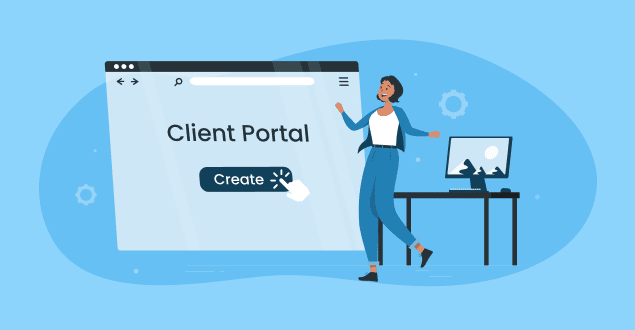Unlock the potential of client portals to enhance customer service, streamline processes, and offer tailored experiences that promote client loyalty and corporate success.
Customers are the sole catalysts of a company’s economic expansion. The contemporary market is competitive and necessitates that enterprises adopt creative and customized solutions.
Alongside static websites, many businesses are allocating resources to client portal development services. What is the reason? The justification is straightforward. According to Forbes, based on research by Epsilon, 80% of customers are more inclined to engage with a firm that provides tailored experiences, and 90% find customization attractive.
How a Client Portal Can Elevate Your Customer Service
There are multiple reasons for the necessity of using a superior client portal for your business. Let us examine scenarios in which your enterprise can get advantages from providing a dedicated, private location for each client:
- Client portals save time and resources, reduce repetitive procedures, centralize information, and seamlessly enhance your branding.
- Clients can access the portal at any time and from any location. This flexibility is essential, particularly in a global business context where time zones may impede real-time communication.
- A client portal can replace the entire integration of a customer database, legal and financial software, a chat system, a calendar, and a resource library.
- It can serve as a personal assistant; help desk, public relations representative, and event manager for both you and your client—completely secure, always available, and tireless.
- Client portals efficiently organize business and customer data in a structured, secure, and logical manner. A client portal eliminates the need for multiple tools. It allows for the centralized storage of financial, legal, and procedural information for each client individually.
- A client portal can be established to enhance communication, improve client satisfaction, and reinforce your business. Portals facilitate client interaction and enable engagement at their preferred pace.
- Client portals are developed with a focus on security. They frequently use encryption, access controls, and authentication protocols to safeguard sensitive customer information. This instills trust in clients that their information is secure.
- Project milestones and timelines can be monitored effortlessly. A client portal also facilitates appointment management and booking handling.
- Client portals encompass invoicing and payment processing functionalities. Clients are able to access invoices, execute secure payments, and monitor their billing history. This optimizes the payment procedure and diminishes billing conflicts.
- Your client portal can be utilized as an element of your marketing plan. Customized marketing based on a customer’s purchasing history and preferences might result in elevated conversion rates and enhanced sales.
Excellent Examples of Client Portals That Will Amaze You
Numerous industries and business segments exist, each featuring several client portals tailored for distinct functions. Presented below are five prevalent categories and their applications:
Client Collaboration and Project Management Portal
This portal type aims to facilitate the management of client projects. It facilitates project monitoring, enabling clients to observe progress, schedules, and deliverables. This fosters confidence and reliability, as clients seek transparency and insight into procedures and workflows. This portal facilitates safe document sharing for the exchange of project-related files and communication, enabling direct collaboration with clients. Construction companies, marketing agencies, and IT organizations exemplify the entities that these client portals can optimally assist.
Digital Sales Rooms
Digital sales room portals concentrate on sales-related interaction and are frequently utilized in mergers and acquisitions. Companies can share product information, price, and proposals via sales presentations. Clients may thereafter examine and electronically approve contracts. Functions like deal tracking can enhance your oversight of the sales funnel and the acquisition of new clients. This client portal facilitates the offer of personalized customer experiences, empowers purchasing supporters, and leads internal purchasing discussions in your favor.
Customer onboarding and enablement Portals
Major software corporations, especially SaaS enterprises, utilize these tools to optimize new customer onboarding procedures. This client portal can efficiently store instructions, tutorials, product FAQs, and facilitate the configuration of new accounts. Training resources such as demonstrations and videos enable clients to engage at their convenience—an advantageous attribute for SaaS clients seeking user-friendly, self-service alternatives. This client portal provides a content management system, engagement tracking, and the capability to message, comment, and communicate in a single location without requiring significant time investment from your team.
Business Service Hubs
Business service hub client portals can be used to centralize several facets of client support. Billing and invoicing functionalities enable clients to access bills and execute payments online, while service tickets and requests can be promptly sent and addressed. Comprehensive resource libraries provide clients with access to industry-specific information. Financial companies, such as banks, provide these hubs due to clients’ preferences for digital access and superior customer service. Another benefit is that the money processing procedure is entirely safe and easy to use, requiring little guidance.
Customer Service Portals
Customer service client portals improve customer support and provide self-service solutions for clients. Customer service portals offer FAQs and knowledge-base functionalities to address frequent inquiries. Customers can make new support requests, monitor their status, subscribe to necessary content, and study knowledge base updates—all from a unified platform. These support portals offer comprehensive visibility into internal progress, alongside automated and manual communications, as well as real-time monitoring and analytics.
Here’s What Makes a Client Portal Truly Effective
A client portal must incorporate numerous essential aspects to provide an optimal customer experience, including:
Knowledge Base: Your client portal must possess an integrated knowledge base or facilitate integration with other knowledge base software. This approach enables the management of both internal and external knowledge bases, facilitating seamless information sharing with colleagues and clients.
Secure file transfer with access controls: A client portal enables clients and team members to access and exchange essential files for seamless cooperation, facilitated through secure networks or communication channels.
Customization of brand identity: Rather than integrating your clients into a fragmented system, enhance their customer experiences through a cohesive interface that incorporates familiar elements such as your logo, website, domain, and brand colors. Seek client portal technologies that enable the incorporation of your own branded aesthetics into your channel.
Management of projects and tasks: Monitor the advancement of individual tasks and the whole project through a collaborative client portal. Consolidating all elements in a single location simplifies project and client administration, particularly in the context of high-touch client engagement.
Identify opportunities for Upselling: Utilizing interaction data from a customer portal enables a deeper comprehension of client demands and preferences. It is also advantageous for recognizing more upselling prospects and acquiring new clientele.
Conclusion
By providing a dedicated client portal, businesses can ensure 24/7 access, tailored experiences, and secure interactions, all of which enhance service quality, fortify connections, and promote sustainable growth.





